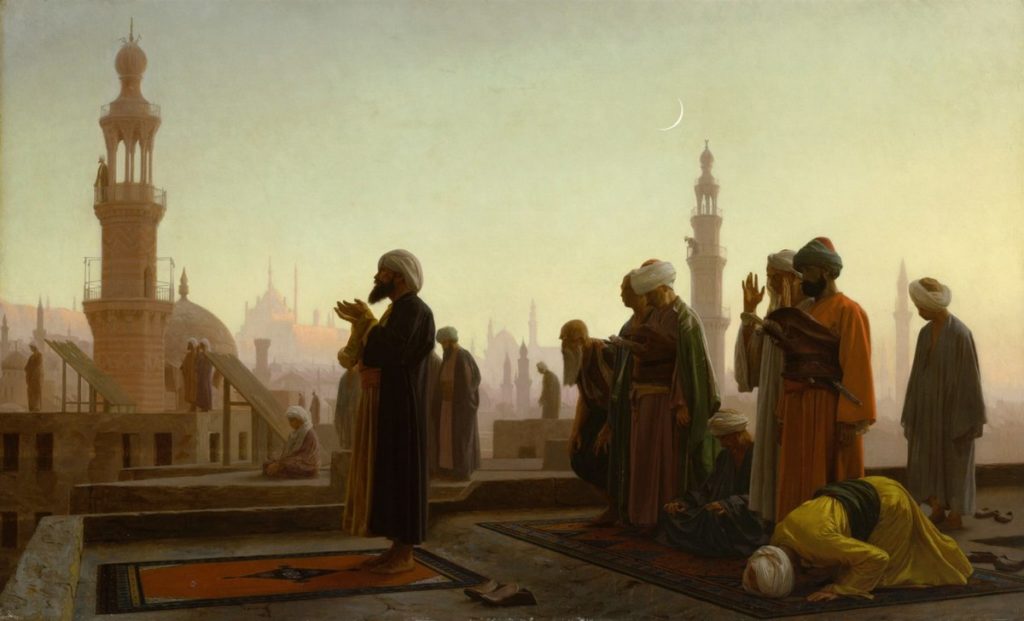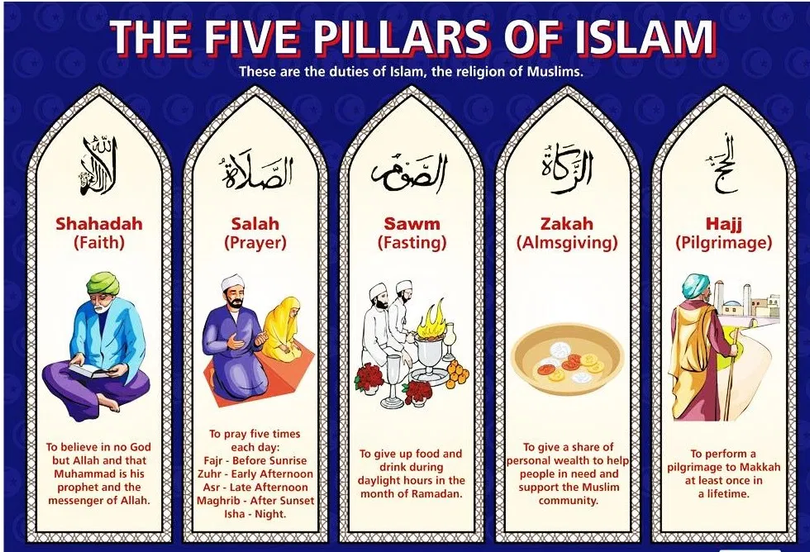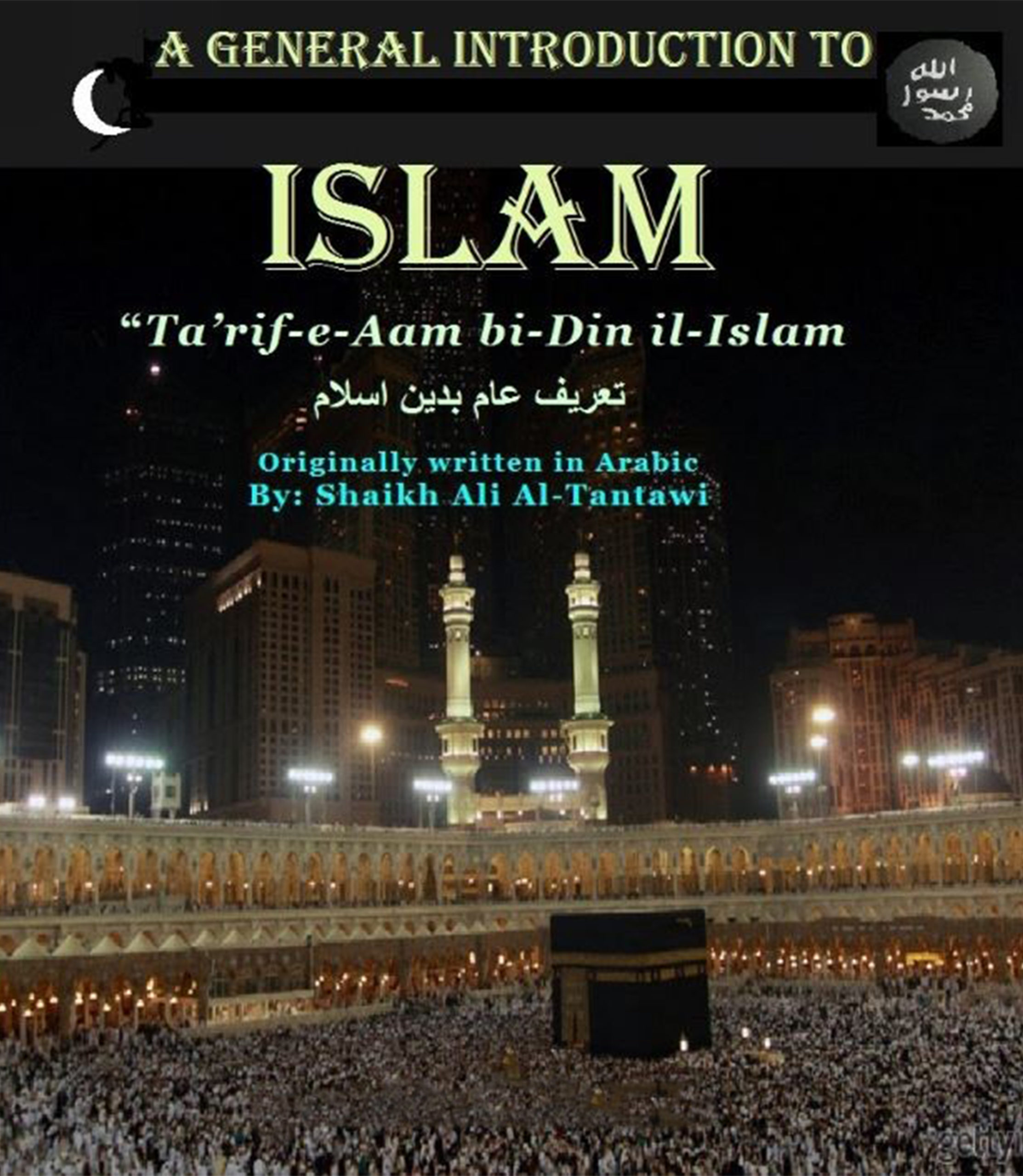Explaining Islam in Brief
Once Shaikh Ali Tantawi asked his students the following question:
“If a non-Muslim asks you to explain all about Islam in an hour, what you would do?”
This is how they responded:
“That: would be impossible! He would have to study the principle of the Oneness of God, commentaries on the Holy Qur’an and he’d have to learn how to recite from the Holy Qur’an, study the Hadith (sayings of Prophet Muhammad (peace be upon him), the system of Islamic law. He’d also need to delve into problems and issues which could take him fifty years’ I retorted by saying,” Glory be to God!
What about the simple and uneducated Bedouin who came to our Prophet and learned all about Islam Just by staying in his company for a day or even less?
didn’t those very same Bedouin then carry the message of Islam to the desert folk, and in turn become their teachers and guides?
Don’t you remember how our Prophet (Pbuh) explained our religion in three brief sentences?
1. He spoke about Iman (faith)
2. Islam (the religion) and
3. Ihsun (Man’s realization of his relation to God).
So why is it, then, that we can’t explain our religion in an hour in this day and’ age?
So, what is Islam and how does one become a Muslim?
What is Islam? How to be a Muslim?
Prerequisites of Joining a Group or Association: Every creed, whether its basic principles are based on truth or falsehood, every society, good or bad, and every political party, regardless of whether its intentions are noble or not, operate on certain basic principles and precepts that define its goal and outline its course of action. These principles and precepts are put together in the form of a constitution to guide its members and followers. Anyone wishing to become a member of such an organisation would need to start off by studying these guidelines. If he finds that they satisfy both his conscious and subconscious mind, and believe without any doubt in their validity, he will decide to Join that organisation and become one of its members and supporters.
From then on, he has to obey the laws laid down in the constitution and to pay the membership fee. He also has to prove, in due course, his genuine commitment to the principles and precepts of the organisation. This means he has to remind himself about those principles regularly and make sure he does nothing to contradict them. He has to set an example, through his character and behaviour, of one who ardently follows and supports those principles. So, we can say that membership to a society means:

0 Knowledge of its system.
0 Belief in its principles.
0 Adhering to its regulations.
0 Conducting oneself in everyday life according to those principles and regulations.
These are accepted conventions which are all applicable to Islam.
Fundamental Principles to Embrace Islam
Anyone wishing to embrace Islam has to accept its intellectual principles with total conviction right from the start. This means he will have developed the faith within himself. The principles he has to accept are outlined briefly as follows:
0 This material world is not the “all’ and “end of all’ of existence and life in this world is only a part of the eternal life.
0 Man existed even before he was born and will continue to exist after death; he did not create himself but had been created before he was conscious of his human existence.
0 The inanimate objects around him couldn’t have created him, as he is a rational being and they are not everything in this universe has been created from nothingness by the one God, God the Almighty.
0 God is the only one who grants life and causes death. It is He who created everything, and if He wishes. He will destroy and obliterate it.
0 Almighty God does not resemble His creation in any way. He existed before this creation and He is eternal and has unlimited knowledge.
0 He is completely just in a way that cannot be assessed in human terms; it is He who has laid down what we call the laws of nature.
0 He has created everything according to a well-defined measure before all creation, thus all the phenomena of activity, inactivity, consistency and inconsistency that we can observe in both animate and inanimate beings have been clearly defined and distinct boundaries have been set.
0 Man has been bestowed with the power of intellect to deal with whatever matters he is presented with and he has been given the power of reasoning with which he can make his own choice and will power to enable him to achieve what he wants.
0 God has created an eternal life beyond this temporary life, where the doer of good will be rewarded with a life in paradise and the wrong doer will be punished and exist in hell.
0 This God is One. No one else may be worshipped but Him; no one can take us nearer to Him to plead on our behalf without His permission. Thus we should worship God alone, in all sincerity and purity.
0 All the material beings that we can see and feel which have been created by Him. He has also created unseen beings, some animate and others inanimate, which we cannot see. Among the unseen beings are the angels, who have been created for absolute good; and then there are the Satan’s who have been created as dark and negative forces.
0 Apart from these there is a third category of unseen beings, the jinn, who are divided into Satan’s and “good’ or “obedient’ jinn and from amongst human beings.
0 God selects certain people to whom the Shari ‘a (Divine Law) is revealed, so that they can guide people towards it, these people are the prophets.
0 This divine law is contained in all the books revealed from the God. God takes us through progressive” steps in each book until the final book, the Holy Qur’an. Books that preceded it were either distorted or got lost and forgotten. The Holy Qur’an, however, has remained intact. The last of these prophets is Muhammad bin Abdullah, an Arab of the Quraysh tribe. With him there was an end to all the previous divine messages and religions. There has been no other prophet since his time.
0 The Holy Qur’an is the constitution of Islam. Whoever endorses the fact that it has been revealed by God and believes in it completely, is a Mu’min (believer). Iman (faith) in this sense can only be seen by God because human beings cannot penetrate into human thoughts and know what is in them. Therefore, it is essential, in order to be accepted in the fold of Islam, that a man declare his faith.

Declaration of Faith
An individual can pronounce his/ her “faith in Islam’ by pronouncing” I bear witness that there is no God but Allah and I bear witness that Muhammad is the Prophet of God. The moment he pronounces this statement of faith he becomes a Muslim and is entitled to all the rights enjoyed by Muslims; he also agrees to perform all the duties (ibadat) enjoined upon him by Islam.
Duties (ibada) of A Muslim
The ibadat (duties) of a Muslim, are the prescribed forms of worship. There are only a few and they are easy to perform and do not require much effort or exertion. There are four, as outlined below:
1. Salah (Prayer) A Muslim has to pray two rak’ats (prostrations) at dawn, during which time he has communion with his Lord. He asks Him of His goodness and seeks refuge in Him from His punishment. Before making these prostrations, a Muslim has, to perform wudu (ablutions): he washes his face, hands and feet, or takes a bath if he is in a state of ritual impurity. Besides the dawn prayer, he has to pray at four other times four rak’ats at midday; four rak’ats in the afternoon; three rak’ats at sunset; four rak’ats at night: These are obligatory (faradh) prayers, the performing of which will not, on the whole, take more than half an hour per day. There is no particular place or person required for the performance of these prayers, and it is not necessary for a Muslim to have an intermediary when he prays, as he prays directly to his Lord. [The prayer leader (imam) leads the prayer, in Masjid or any other clean place, imam could be anyone among the congregation, who can recite Quran.]
2. Fasting (Saum) In a certain month during the year a Muslim has to fast. This is known as the period of Ramadan. Breakfast is consumed before dawn, lunch is taken after sunset, and during the day all Muslims abstain from food and water and must not have sexual intercourse. Ramadan is a month of self-purification for every Muslim when he purifies his body and soul. It is also a month to fulfill the desire to do good and be generous, and to reflect the brotherhood of man in the material life.
3. Zakah (alms) A Muslim has to give 2.5 % of his wealth as alms to the poor and needy. He does this on an annual basis, once his own needs and those of his family have been met. This financial support paid by every Muslim comes as a great source of comfort’ and assistance to the poor, the sick and the needy. It thus helps to alleviate poverty and establishes a form of social security.
4. Congregations Islam has arranged certain periodical gatherings for Muslims. They congregate together five times a day to offer prayer. There need be no disruption of work for anyone whatever his trade or profession. Those who miss the congregation can pray at home, though they will, in fact deprive themselves of the joyful reward of praying together in a group. Then there is the weekly congregation on Fridays for Jummah prayer. This lasts for less than an hour, and it is compulsory for all male Muslims to attend. Besides the above, there are mass congregations held twice a year on the occasion of the two Eid’s (festivals). Attendance is not compulsory and they last less than an hour. Finally, there is the annual world congregation known as the Hajj. It is a kind of mammoth public gathering, held once a year at Makkah. This congregation provides guidance in all aspects: spiritual, physical and intellectual. A Muslim is expected to attend once in his lifetime, but only if he is able to do so. These are the duties and acts of worship enjoined upon every Muslim.
Avoiding Evil Acts
Apart from the above, abstention from certain modes of behaviour are also deemed as ibadah (worship). These are actions which any sensible person would deplore, such as killing without a valid reason, intruding on the rights of others, aggressive behaviour and all forms of injustice, any kind of intoxication which would affect the brain, adultery, since it destroys honour and dignity and violates the sanctioned form of blood relationship.
Other forms of forbidden behaviour include usury, lying, betrayal and deserting any form of military service which seeks to glorify the Divine Writ, making false oaths or producing false witnesses and, above all, disobedience to one’s parents or dismissing them and neglecting their needs.
However, God forgives a Muslim who fails to carry out some of his duties and disobeys some of the Islamic laws but repents and asks for pardon. On the other hand, a Muslim who does not repent will be considered as a rebel, who will be punished in the next world. This punishment will, however, be only temporary and will not be equal to that of a non-believer.
As for a Muslim who refuses to acknowledge any basic Islamic principle or belief, rejects his duties and Islamic regulations or denies even the smallest detail outlined in the Holy Qur’an, he will be considered as an apostate deprived of his Islamic identity. Apostasy is similar to a crime of high treason, from the Islamic point of view. Unless a person gives up his un-Islamic beliefs and repents, he will be given a death sentence [by the court of law not individuals or groups, mob justice or lynching will create mischief on land, fisad-fil-arz, the crime with capital punishment.]
Total Acceptance of Faith-No Hypocrisy
Faith has to be accepted in totality and, therefore, a denial of any aspect is deemed as a denial of the whole. Therefore, anyone who accepts 99% of the faith but denies 1% is considered an infidel. You may come across Muslims who are non-believers. They can be compared with someone who joins a political party or a society, attends all its meetings, pays his subscription and does whatever is required of a member, but nonetheless refuses to accept its principles and remains unconvinced.
It may seem that such a person has joined the party or society simply to find out what’s going on or to create trouble. Such a Muslim is a hypocrite hypocrisy is defined as outward profession of faith and concealment of disbelief Prophet Muhammad (peace be upon him), used to say that a hypocrite can be recognised in three ways:
1. Failure to keep his promise,
2. Lying and
3. Betraying anyone’s trust.
A hypocrite pronounces statements of faith and performs his religious duties, yet deep and down he remains unconvinced. Such a person may be considered a Muslim by the outside world but not by God, who knows what is hidden in our hearts and innermost beings.

The Believing Muslim
One is a believing Muslims if he/ she fully believes in the intellectual and theoretical fundamentals of Islam, which are:
(a) Giving full testimony to the existence Allah (God) and declares He has neither associate nor intermediary.
(b) Belief in the angels, all Prophets and all revealed Holy Books, including Qur’an.
(c) Belief In the destiny.
(d) Expression of the statements of faith (Shahada, kalimah).
(e) Performance of the obligatory prayers.
(f) Fasting in the month of Ramadan
(g) Payment of zakat (alms);
(h) Performance of Hajj (pilgrimage) to Mecca once in a lifetime, if this is possible.
(i) Abstention from everything that is forbidden by Muslim consensus.
Generally speaking, adhering to the Iman (Faith) is more beneficial to us we feel better and enjoy tremendous rewards. This is why, even though it may be hard to stick to these laws 100%, we feel better in ourselves if we follow them.
Our Prophet Muhammad (peace be upon him) summed up the characteristics of a true Muslim in an eloquent sentence which states the essence of faith and action in a nutshell:
“You should worship God as if you can see him, or else He sees you”
This means we must strive to be in total awareness of God’s presence all the time. This is the very essence of Islam to be God conscious in all our actions, whether or not they are serious. God is watching us constantly and is aware of our every move. This is why anyone who is truly God-conscious will obey His laws, and he will not despair either, knowing that God is with him all the time. A person who is strengthened in this way will not need to ask for help from anyone because he can always ask God to fulfill his needs. And, if anyone disobeys God’s laws, as it is in his nature to sin, provided he asks for forgiveness, God will forgive him. This is just a brief introduction to Islam and in to following articles we shall be looking into all aspects of faith in detail.
A Sinner Muslim
If a Muslim fails to perform some of his obligations and is remiss in practice or commits some such actions as are forbidden, yet he believes in the liability of all obligations and the impropriety of all unlawful deeds, he will continue to be a Muslim though he will be a sinner. [The concept of Takfeer adopted by terrorists i.e. declaring a non-practicing Muslim, to be “apostate’ and liable to be killed, is rejected by consensus of Ulema]
Important Terminologies
Before going into the subject of doctrine in detail we should define certain terms which frequently are referred on this subject and which are often used by scholars of Islam. These terms are “Doubt’ “Presumption’ and “Knowledge’. After we have examined them, we shall begin to look into the meaning of faith.

Doubt
Descartes; the renowned French philosopher and mathematician, and, before him. Imam Ghazali in his book” Savior from Misguidance both chose “DOUBT’ as a point of departure for their enquiry into certainty. In fact, Descartes: used “Doubt’ as a means to reach certainty.
So what do we mean by “Doubt’?
If someone were to ask you while you were staying in the Centre of a city, that whether it was raining in the suburbs? You would be unable to reply, even though the suburbs are only about twenty miles away. You would have no definite evidence one way or the other. And this is the case with the “concept of doubt’. You can make a guess, but you cannot be 100% sure.
Presumption
However, if you were to look into the distance and see some rain clouds you might be inclined to say:
“It looks as if it is raining in the suburbs.
This means that it’s very likely that it is raining, and this possibility regarding the existence of something, is known as “Presumption’.
Should you take a further look and notice that the rain clouds are quite thick and heavy, and also see a flash of lightning, your presumption regarding the possibility of rain increases and your response to the original question will be more positive. At this point you might well reply:
“I’m inclined to think it’s raining in the suburbs now.
Knowledge
But if you were to go into the suburbs and actually see the rain failing, your presumption would become a certainty. And this is what scholars’ term as “KNOWLEDGE’.
If we examine the various meanings of the word “knowledge’ we see that firstly we have “absolute knowledge’ as opposed to ignorance. Knowledge also embraces science in contrast to the arts and philosophy. For example, physics and chemistry are both sciences whereas art and poetry belong to the domain of the arts.
In the context of science where the ultimate goal of knowledge is to seek the truth, the intellect is used as a tool to achieve this aim. The methods adopted are “enquiry’, “experiment’ and” deduction’.
In the case of the arts, it is concerned with the appreciation of beauty. Its means are perception and consciousness while a good taste is instrumental to success in it. Definition of Faith needs no proof. We intend to discuss that knowledge which in contrast o doubt and presumption stands for certainty and positiveness. This knowledge is of two kinds:
Obvious Knowledge
It is the Knowledge gained through the senses and observations need no proof. For example there is a mountain before you which does not need any proof. You see it there and it exists. Every sane person who sees it will admit of its existence. Its presence is the proof of its existence. This knowledge is called essential or axiomatic knowledge.
Theoretical Knowledge
It is that knowledge which requires proof. For example the formula that the sum of squares of base and height o a right angled triangle is equal to the square of its hypotenuse; is something which requires proof. Any scholar or a student who finds the proof of that will know the fact and will admit it. But an ignorant unlettered person will not know it and will not accept it until he is given vivid proof of that even though the triangle along with squares on its sides are placed before his yes.
This knowledge is known as Theoretical Knowledge that is the knowledge which cannot be acquired without proof.
Self-Evident Truth and Creed
Some theoretical knowledge needs proof because it cannot be perceived merely by logic and observation. Nevertheless, it is common and popular knowledge of which everyone, regardless of age or education, is aware. Such knowledge almost falls into the category of essential knowledge. For example:” A part is smaller than the whole is a theoretical statement, but, although the category of theoretical knowledge basically needs to be proved, you will hardly find anyone who doubts this statement or needs evidence of it. Even a child will accept it. If you were, for example, to take a bar of chocolate from a child and give him back just a small piece, telling him that the piece you have returned is bigger than the bar of chocolate, he would not be convinced and would not accept it. This is because it is self-evident that any part of any thing is smaller than its whole.
The statement regarding identity that is, that everything has an identity of its own, is also a self-evident truth. If someone were to ask you to prove that the pen you were holding was not a teaspoon, you would respond by saying:” That’s quite obvious and doesn’t need any proof!
So, these self-evident truths are obvious facts which everyone acknowledges facts that do not need proof. And when a self-evident truth enters the inner consciousness and establishes itself there, it creates an impact on intuition and all aspects of behaviour and is known as faith.
Belief in it is known as Iman. However, we all know that although people often believe in truth, more often than not they believe in “untrue’ ideologies. Nowadays there are many breakaway groups with misleading principles not based on truth, and these groups have attracted a lot of ardent followers who sacrifice all they have for the sake; of these groups. Such people cannot be regarded as believers; in the absolute meaning of the word. God says in the Holy Qur’an:
“Art thou not aware of those who, having been granted their share of the Divine Writ, (now) believe in unfounded mysteries and in the powers of evil. (Qur’an;4:51)
“And most of them do not even believe in God without (also) ascribing divine powers to other beings beside Him (Qur’an; 12:106).
As for Iman, and all the derivatives of this word, they are used exclusively to denote belief in all that pertains to the Holy’ Qur’an and the Sunnah (tradition).
The Belief (Iman)
This belief can be summed up as follows:
1. To believe that:
2. The God (Allah) as the One and Only God, unique and peerless.
3. He alone is the Master, All-powerful and Almighty, the One Who has supreme ownership of all things.
4. He alone is to be worshipped, and no one else is to be associated with Him in worship.
All that has been revealed to His prophet (Holy Scriptures), the angels, the prophets and the Day of Judgment and destiny, regardless of whether this destiny is in our favour or full of hardship.

The Believer (Mu’min)
A person who holds the above belief is a Mu’min (believer). But if he makes any compromise regarding them, withdraws from them or hesitates to endorse his beliefs or expresses doubts, he will be lacking in the quality of Iman and will not be deemed a Mu’min (true believer).
1. Just as one obtains conviction (Yaqin) through one’s observation and senses, so is true news the source of conviction.
2. We have no right to deny the existence of those truths which we cannot perceive through our senses.
3. A firm faith in the existence of God is the natural nucleus of and is concentrated in the human nature.
4. There is a spiritual world at the back of this material world, which we cannot perceive.
The belief in life after death tantamount to belief in the existence of Allah.
[Conviction Yaquin is the fruit of faith Iman]
To be continued
References
https://SalaamOne.com/islam/




